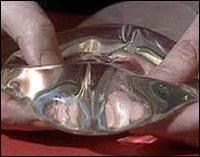







|
News and Information
'Natural' breast implant advance
| February 17, 2005 |

By Michelle Roberts
BBC News health reporter in Washington
Image of a breast implant
Artificial implants can rupture and leak
US scientists say they have made a breakthrough to produce natural breast implants using human stem cells.
The University of Illinois team took stem cells destined to become fat cells and grew them on a special gel-like scaffold, they told a US conference.
The scaffold can be moulded into any shape, which means the implants keep their size and shape better than artificial ones.
There is also no risk of rupture and leakage, they said.
Natural implants
Other researchers have looked at combining a woman's own fat tissue with stem cells to make a natural implant.
But the sheer quantity of fat tissue needed can be large and requires invasive surgery.
Dr Jeremy Mao's team used a different approach.
He told the annual meeting of the American Association for the Advancement of Science that they had taken stem cells from the bone marrow of healthy volunteers using a needle.
These cells are capable of becoming many different cell types under appropriate conditions.
Patients will have a choice - stem cell grown structures or an artificial implant
Lead investigator Dr Jeremy Mao
The researchers placed the stem cells onto the special scaffold that mimicked the natural environment in which fat cells grow.
They implanted these cell-seeded scaffolds under the skin of eight mice.
After four weeks, the stem cells had grown into fat cells and the implant retained their original dimensions.
In comparison, conventional implants can lose 40-60% of their volume over time, say the researchers.
Although more studies need to be done, Dr Mao told the AAAS meeting that the technique had the potential to revolutionise both breast surgery and other reconstructive surgery, such as facial reconstruction.
"Patients will have a choice - stem cell grown structures or an artificial implant," he said.
The findings are due to be published in the journal Tissue Engineering. |
Source: www.bbc.com |
| http://news.bbc.co.uk/2/hi/health/4274171.stm |
|
| Support Caprivi Freedom |
Fill out the form below to become a member of this site and receive our regular newsletter.
|

|

